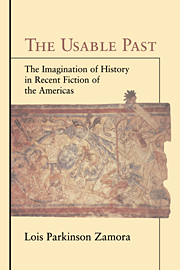6 - Clichés and Community
Published online by Cambridge University Press: 01 September 2009
Summary
… la parole humaine est comme un chaudron fêlé oú nous battons des mélodies à faire danser les ours, quand on voudrait attendrir les étoiles.
Gustave Flaubert, Madame Bovary… human speech is like a cracked kettle on which we tap crude rhythms for bears to dance to, while we long to make music that will melt the stars.
Gustave Flaubert, Madame BovaryI WANT TO DISCUSS a final means by which usable pasts are created in contemporary American literature. Manuel Puig's El beso de la mujer araña (The Kiss of the Spider Woman, 1976) and Luis Rafael Sánchez's La guaracha del Macho Camacho, (Macho Camacho's Beat, 1976) demonstrate how communities and traditions may be constructed from the clichés of popular, nonprint media: radio and television, popular music, and the movies. Their intertextuality is less Borgesian than Flaubertian; like Flaubert (and generally unlike Borges) their fiction mixes levels and forms of discourse – musical rhythms and lines, visual forms, spoken languages. In the celebrated phrase from Madame Bovary (1856) that I have cited as my epigraph, Flaubert suggests the problem with which he did lifelong battle and the paradox that lies at the core of all literary art: how to transform these common discursive forms into literature.
- Type
- Chapter
- Information
- The Usable PastThe Imagination of History in Recent Fiction of the Americas, pp. 178 - 195Publisher: Cambridge University PressPrint publication year: 1997

